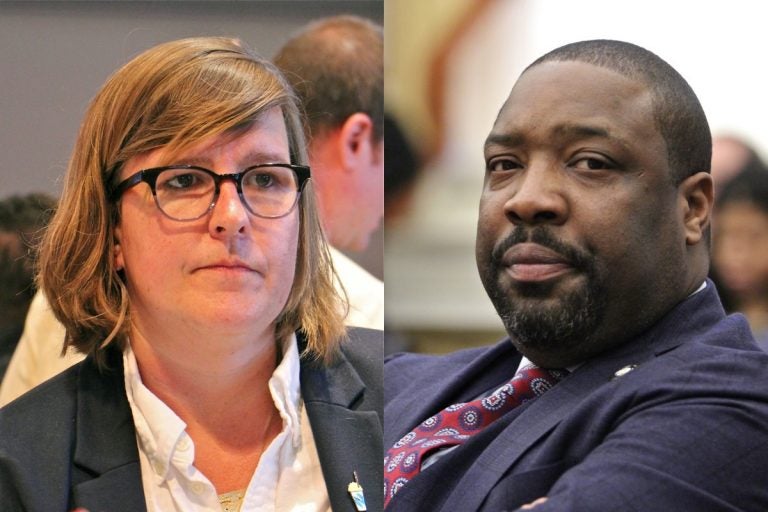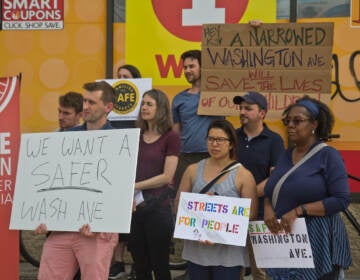In race spotlighting South Philly gentrification, Kenyatta Johnson wins
Both Vidas and Johnson also explicitly campaigned on the issue of housing costs, councilmanic prerogative, and other land use issues.
Listen 2:54
Lauren Vidas challenged incumbent Councilman Kenyatta Johnson in Philadelphia's 2nd District. (Emma Lee/WHYY)
This article originally appeared on PlanPhilly.
–
Call it the urbanist reality check.
Urban planning policy generally doesn’t make the cut for election season banter. Candidates run on education, safety, crime, jobs — not development policy. This primary seemed different, at least in one of Philadelphia’s fastest gentrifying areas — the 2nd District, encompassing Southwest Center City, Point Breeze and other parts of South Philadelphia.
Incumbent Kenyatta Johnson ran against Lauren Vidas, a lawyer and former staffer for ex-Council member Bill Green who later returned to the chamber as a lobbyist. While she made a living working for interest groups such as the beverage industry, she earned her urbanist bonafides as a board member for the South of South Neighborhood Association. Working alongside her neighbors, she helped build a parklet and completed several other beautification projects promoted by the community group.
“We need to empower the Planning Commission,” she told The Philadelphia Citizen in March. “It’s toothless. Developers and Council ignore it. It’s important to hear voices of highly trained professionals who are trained to help manage a city’s growth.”
Both Vidas and Johnson also explicitly campaigned on the issue of housing costs, councilmanic prerogative, and other land use issues. Johnson made property tax relief his top policy proposal; Vidas released a white paper on affordable housing.
And, as candidates, Johnson and Vidas themselves mirrored some of the larger dynamics that have emerged as the district has gentrified.
Johnson, who was born and raised in the working-class Point Breeze neighborhood ran campaign mailers depicting himself as a familiar face. He prioritized property tax relief for longtime residents and said he would use councilmanic prerogative –– a tradition that gives council members broad deference over land use issues –– to combat gentrification.
In contrast, Vidas moved to the Graduate Hospital neighborhood a decade ago as the area was seeing an increase in development. She instead ran on reforming sclerotic traditions inside City Hall, specifically pledging to abolish prerogative which she said has engendered a “pay-to-play” culture between council members and developers.
Their distinct identities played out at the polls. Isaiah Martin, a Point Breeze pastor and Johnson supporter, identified gentrification as a major concern, particularly for senior citizens. Although jumps in home prices have recently slowed, some parts of his neighborhood have seen home values increased by 400 to 500% since the year 2000.
He said he wanted the district to be represented by someone who understood how the neighborhood had changed in recent decades.
“It’s overwhelming for those of us who are aged and those of us who have history here and have been here for a very long time,” Martin said, of the recent surge of housing construction. “Now all of a sudden we seem to be pushed out, taxed out or bought out.”
The pastor, who lives on the 2200 block of Pierce Street, cited the Longtime Owner Occupants Program, which Johnson pushed to expand, as a key protection for elderly residents who were more vulnerable to property tax increases associated with new development. He wanted Johnson to secure another term in hopes that he would correct some of the larger racial inequalities Martin saw underpinning gentrification.
“If they can bring the contractors and people together in a collaborative effort and you can give a little and we can get a little, that’s important,” he said. “We see a lot of people coming into our communities, not people of color, and they’re doing a lot of work as contractors. Then, people of color are standing on the corner and they’re unemployed.”
Vidas’ message of cleaning up municipal government, meanwhile, sold well on her home turf. Several voters at polling places inside Graduate Hospital’s Chester A. Arthur School identified Johnson’s involvement with the sale of city-owned lots to a childhood friend at favorable prices as a problem.
Keith Sutter, a supply chain manager and a seven-year resident of the neighborhood, described himself as an enthusiastic Vidas supporter.
“The investigations of Kenyatta, especially councilmanic privilege and giving properties to his friends, was definitely a negative,” he said.
But ultimately, Vidas’ pitch –– and $165,000 in fundraising –– wasn’t enough. Although she slightly outperformed developer-turned 2015 candidate Ori Feibush, she fell short of Johnson’s 60% of the vote.
After his victory, Johnson delivered the following remarks.
“I represent 15 different neighborhoods and I will continue to fight aggressively for each and every one of them,” Johnson said. “They all have their own unique needs. There’s no one-size-fits-all strategy for them.”
Joe Cutaia and Maya Clark-Cutaia were two Vidas voters. They said they had come out specifically to vote against Johnson and similarly cited his involvement in questionable land deals. The couple, both healthcare workers and neighborhood residents since 2005, acknowledged that gentrification was an issue –– but not the one that had driven them to the polls.
“It depends on what side of the gentrification you’re referring to,” Joe Cutaia said. “If you’re in a gentrified neighborhood you want more gentrification. If you’re in a non-gentrified neighborhood, you don’t want to be kicked out of your neighborhood.”
But for many other voters in South Philly, these issues simply took a back seat to demands for basic city services, particularly in more outlying neighborhoods that have seen less housing pressure.
At a polling place south of Snyder Avenue, Arthur Jenkins said he thought of gentrification more as a problem experienced in other, bigger cities. He said he had mainly come out to support Mayor Jim Kenney, who he credited with renovating a local playground with revenue from the city’s tax on sweetened beverages.
“I can actually see what he did with the soda taxes at the playground where I take my kids and grandkids,” Jenkins said.
Jenkins said he was unfamiliar with Vidas and planned to vote for Johnson because he recognized his name from prior elections.
Another voter, Zachary Stone, said he supports Johnson and was also concerned about gentrification leading to the displacement of his neighborhoods. He was broadly supportive of affordable housing initiatives but didn’t know enough about housing policy to say more.
His pet issue was more basic: potholes.
“The city is going in a good direction and I want it to keep going in a good direction,” he said. “But if there was a candidate who just focused on potholes he would probably get my vote 99% of the time.”
On Election Day, Councilman Johnson was out talking to voters. When asked if he had heard many voters talking about gentrification concerns, he said that he had not.
“It’s been a topic, it’s always a topic. But it hasn’t come up that much today,” he said. “For the most part, it’s been a laid-back day.”
WHYY is your source for fact-based, in-depth journalism and information. As a nonprofit organization, we rely on financial support from readers like you. Please give today.







